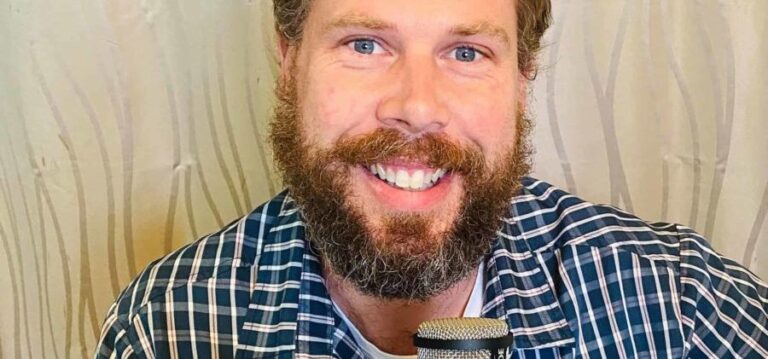Podcast Episode 82: Matthew Petersen
Tune in to the Bees With Ben podcast episode 82 where I talk to Matthew Petersen of Dividing Creek Farm in South Gippsland.

Episode 82 of the Bees with Ben podcast focuses on the transition from hobbyist to full-time commercial beekeeper, with the aid of Ben’s special guest, Matthew Petersen from Dividing Creek Farm.
Matt says he grew up on a dairy farm with a large orchard, and his dad always had five or six hives, so he was bitten by the bee bug very early in life.
However, Matt’s father passed away when he was still quite young, and Matt moved to Melbourne to make money to buy the farm. He tells Ben he started an epoxy flooring business installing hygienic flooring systems in food processing plants, abattoirs, and fast-food businesses. His main customer base came from the food industry, and it gave him some insight into food production. He realized how much he missed the bees and raised nucs to fill in time and to maintain the connection between bees and the farm.
For Matt, the whole reason for raising capital through his business was to enable him to purchase the beef farm near Wilsons Promontory in south Gippsland, where he raises Angus, grass-fed beef – bees were always on the side.
But when the bug really kicked in in his mid-20s, Matt found himself juggling a flooring business, a farm, and the bees, and he was simply wearing himself out.
He reckons the transition to full-time beekeeper took about seven years and says that any hobbyist wanting to go full-time will experience a similar situation, in that you need capital, a job, or some form of backup until you get yourself established. Ben agrees.
Interestingly, Matt reveals that for him, Covid was the final trigger, since lockdowns and the inability to travel interstate meant that he lost much of his flooring clientele overnight.
Ben asks Matt to tell us his biggest highs and lows with bees, and Matt says the biggest high is seeing people consume your product and really enjoy it.
His biggest low came this season when he lost 40% of his hives in a flash flood. He had 120 hives set up to go onto red gum on an old, dry creek bed near Bendigo when a freak storm cell dumped 70ml of rain in twenty minutes about 20km upstream.
Matthew says there was no warning, and it didn’t even rain where the bees were, but they were struck by a four-metre flood, and he is still finding boxes 15km downstream. Matt says it was heartbreaking, but you only get a sore neck looking backwards!
Ben is also keen to find out about an unusual form of hive that Matt uses. Matt accidentally came across the Technoset hive while on holiday in Greece. He says he trialled a variety of commercial hives, with the main issue being that south Gippsland is prone to high humidity and lots of rain, and hives are frequently subjected to damp, cold conditions.
Technoset is a plastic hive made out of food-grade polypropylene. Condensation can be a real problem for plastic hives, but the Technoset is double-skinned, with an insulation layer, and condensation simply drains away between the two walls. Matt says Greece’s climate is much like that of Melbourne, with hot, dry summers and cold winters.
He initially tested the design by mounting a hive on his roof in Melbourne with a northerly aspect. It has now been there almost ten years and is still in perfect condition. He says the Technoset hive is very tough – he once had a full pallet of them filled with honey slip off his truck, and not a single box broke.
Speaking of which, this relates to the only downside of the Technoset hives that Matt has identified; they have slightly curved sides and don’t sit flush on a pallet. Matt says Technoset is a great company that is always innovative, and that they offer a whole range of components for bee hives, like feeders, splitter kits and bases, that go together like lego.
Ben is interested in how Matt moves his bees. Matt replies that he probably does more kilometres than most beekeepers to find honey, as south Gippsland only has a short season, and there is a stringybark flower only once every three or four years – it is not a traditional beekeeping area. Matt uses a trailer as well as a small truck and highly recommends his auto-levelling Ezyloader to take the sting out of the back-breaking task of loading hives. Ben laughs – he ignored Matt’s advice a couple of years back and purchased a manual leveller, only to subsequently upgrade to an automatic model!
Matt says his theory is to take your time and do things right; buy the best equipment you can afford, and if that means you have to wait for a while, then so be it.
Finally, Matt explains that whilst the cattle pay for the running costs of the farm, his farm is a mix of grazing land and virgin bush, and he needed to get a return from the trees.
The bees have been the perfect solution. He has always retailed his honey locally, as he does not produce enough to sell to the big honey packers, and now he has decided to showcase his apiary by constructing a purpose-built extraction plant, with an adjoining honey shop from which customers can watch the entire process. The whole facility is off-the-grid and solar-powered.
Matt says he believes it is very important to show people how their food is produced in a sustainable fashion – it’s all about honey and education. This exciting new project will open on the Labour Day weekend and in addition to honey will stock wax products and honeycomb chocolate.
There will also be a display of live bees. Matt’s goals are to be both economically and environmentally sustainable while generating employment for some locals – and a whole lot of enjoyment!
_
Listen to the podcast here.


